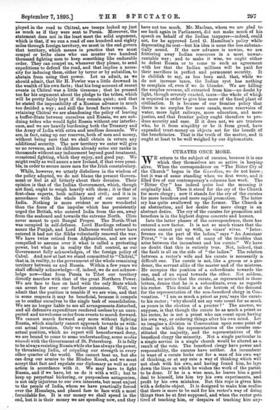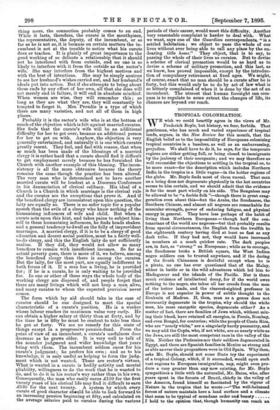CURATES ONCE MORE.
WE return to the subject of curates, because it is one which they themselves are so active in keeping, alive. When the correspondence on "The Bitter Cry of the Church" began in the Guardian, we do not know.; but it was of some standing when we first wrote, and it filled five of our contemporary's columns last week. The "Bitter Cry" has indeed quite lost the meaning it originally had. Then it stood for the cry of the Church for more clergy ; now it stands for the cry of the curates for more benefices and more rapid promotion. The latter cry has quite swallowed up the former. The Church is an abstraction, and her desire for more clergy is an abstract desire. The cry of the curates for promotion and benefices is in the highest degree concrete and human.
Into the latter phases of the correspondence, there has entered a new factor. It is not so much vicars that the curates cannot put up with, as vicars' wives. " Inter- ference on the part of the ladies," says " An Assistant Priest," " is at the root of many of the troubles that arise between the incumbent and his curate." We have no doubt that this is entirely true. Not, indeed, that . the fault is all on the side of " the ladies." The relation between a rector's wife and his curate is necessarily a.
difficult one. The curate is not, like a groom or a gar- dener, the servant alike of the master and of the mistress.
He occupies the position of a subordinate towards the one, and of an equal towards the other. Not seldom, indeed, we notice that the curate, as represented in these letters, denies that he is a subordinate, even as regards his rector. This denial is at the bottom of the demand for the representation of the non-beneficed clergy in Con- vocation. I am as much a priest as you,' says the curate to his rector ; why should not my vote count for as much as yours in the election of a proctor ? ' The answer, we suppose, is that though the curate be as much a priest as his rector, he is not a priest who can count upon having his own way, or ordering things after his own mind. Let us imagine a division in Convocation upon some point of ritual in which the representatives of the curates con- stituted the majority, and the representatives of the beneficed clergy the minority. Not a single particular in a single service in a single church would be altered. as a. result of the vote. The beneficed clergy have power and responsibility, the curates have neither. An incumbent in want of a curate looks out for a, man of his own way of thinking, or at any rate a way of thinking which will not clash with his own, and having found him, he lays down the lines on which he wishes the work of the parish to be done. If he is a wise man, he leaves him a good, deal to himself, lets him try his own experiments, and profit by his own mistakes. Bat this rope is given him with a definite object. It is designed to make him realise that there is more to be said for his rector's way of doing things than he at first supposed, and when the rector gets tired of teaching him, or despairs of teaching him any- thing more, the connection probably comes to an end. While it lasts, therefore, the curate is the mouthpiece, the representative, the deputy, of the incumbent, or so far as he is not so, it is because on certain matters the in- cumbent is not at the trouble to notice what his curate does or teaches. It is plainly of great importance to the good working of so delicate a relationship that it should not be interfered with from outside, and no one is so likely to interfere with it from the outside as the rector's wife. She may interfere from the highest motives and with the best of intentions. She may be simply anxious to see her husband's wishes carried out, and her husband's ideals put into action. But if she attempts to bring about these ends by any effort of her own, all that she does will not merely end in failure, it will end in absolute mischief. When women are wise, they will remember this ; so long as they are what they are, they will constantly be tempted to forget it. Mrs. Proudie is a type of which there are many varieties, and not all of them in high places.
Probably it is the rector's wife who is at the bottom of much of the objection which is felt against married curates. She feels that the curate's wife will be an additional difficulty for her to get over, because an additional person for her to get on with. Anyhow, the objection is very generally entertained, and naturally it is one which curates greatly resent. They feel, and feel with reason, that when so much has been made of the blessings of a married clergy it is rather hard that a curate should find it difficult to get employment merely because he has furnished the Church with another example of this blessing. The incon- sistency is all the more obtrusive because the theory remains the same though the practice has been altered. The very man who is determined not to have another married curate will be loudest at a Diocesan Conference in his denunciation of clerical celibacy. His ideal of a Church is a Church in which marriage is the clerical rule and the curates are the exceptions that prove it. And if the beneficed clergy are inconsistent upon this question, the laity are equally so. There is no safer topic for a popular speech than the evils of a clergy who know nothing of the humanising influences of wife and child. But when a curate acts upon this hint, and takes pains to subject him- self to these humanising influences, he finds heads shaken and a general tendency to dwell on the folly of improvident marriages. A married clergy, if it is to be a clergy of good education and decent social position, must be a fairly well- to-do clergy, and this the English laity do not sufficiently realise. If they did, they would not allow so many benefices to remain with insufficient incomes. So far as actual poverty goes, there is more of it, we believe, among the beneficed clergy than there is among the curates. But the laity, for the most part, are equally indifferent to both forms of it. If a man has a living, he is provided for ; if he is a curate, he is only waiting to be provided for. In one or other of these ways the whole body of the working clergy are disposed of, and people forget that there are many livings which will not keep a man alive, and many curates to whom the expected provision 'never comes.
The form which lay aid should take in the case of curates should be one designed to meet the special characteristic of a curate's position. He is a worker whose labour reaches its maximum value very early. He can obtain a higher salary at thirty than at forty, and by the time he is fifty he must be content to take less than he got at forty. We see no remedy for this state of things except in a progressive pension-fund. From the point of view of an incumbent, a curate's usefulness does decrease as he grows older. It is very well to talk of the sounder judgment and wider knowledge that years bring with them. The incumbent seldom cares for his curate's judgment ; he prefers his own ; and as to his knowledge, it is only useful as helping to form the judg- ment which is not wanted. These are rector's virtues. What is wanted in a curate is bodily activity and mental pliability, willingness to do the work that he is wanted to do, and to do it in his rector's way rather than in his own. Consequently, the man who easily earns £150 for the first twenty years of his clerical life may find it difficult to earn £120 for the next twenty. A system by which every curate of good character should be able to look forward to an increasing pension beginning at fifty, and calculated on the average salaries paid to curates during the various periods of their career, would meet this difficulty. Another very reasonable complaint is harder to deal with. What we want, says one of the Guardian correspondents, " is a settled habitation; we object to pass the whole of our lives without ever being able to call any place by the en- dearing title home." They object, that is to say, to passing the whole of their lives as curates. But to devise a scheme of clerical promotion would be as hard as to devise a scheme of military promotion, and this last, as we know, has proved impossible, except by the introduc- tion of compulsory retirement at fixed ages. We might, of course, enact that no man should be a curate after he is forty, but this would only be to do by act of law what is so bitterly complained of when it is done by the act of an incumbent. The utmost that human foresight can com- pass is to regulate to some extent the changes of life, its chances are beyond our reach.



































 Previous page
Previous page